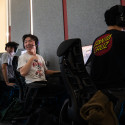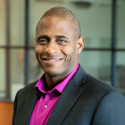Meet the 2022 Distinguished Teaching Award recipients
Twelve faculty members have been chosen to receive this year’s Distinguished Teaching Awards, an honor given out since 1953 to recognize some of the university’s finest educators. An in-person ceremony is planned for 5 p.m. April 19 at the Pyle Center. The event is open to the public, and anyone wishing to join can contact the Office of the Secretary of the Faculty at admin@secfac.wisc.edu for information on how to attend.
Photographs by Althea Dotzour, Jeff Miller and Bryce Richter
Class of 1955 Teaching Excellence Award
Aws Albarghouthi
Associate professor of computer sciences
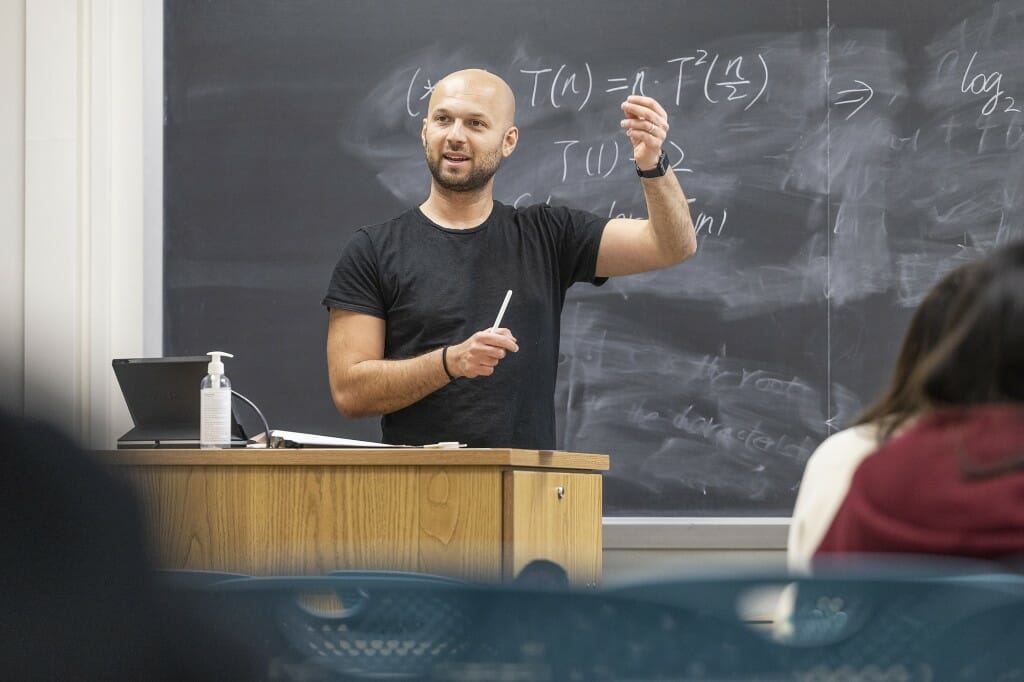
Aws Albarghouthi teaches students in a Computer Sciences building classroom. Photo: Jeff Miller
Albarghouthi’s interactive and engaging teaching style encourages collaboration among students to solve problems, refining their solutions while learning from their mistakes along the way. Material is presented contextually, where the subject is brought to life by presenting it against a historical backdrop, as well as thinking broadly of the social implications of the technology studied. He is known for being an engaging speaker who combines salient points on the life and career of graduate students with humorous anecdotes about his own experiences that humanize and connect him with the audience. In addition to teaching established courses like Principles of Programming Languages, Albarghouthi also developed Verified Deep Learning, a new course that addresses societal needs from computing. In support of this effort, he authored “Introduction to Neural Network Verification,” a textbook that is freely available and has already been used in courses around the world.
William H. Kiekhofer Teaching Award
Joshua Calhoun
Associate professor of English
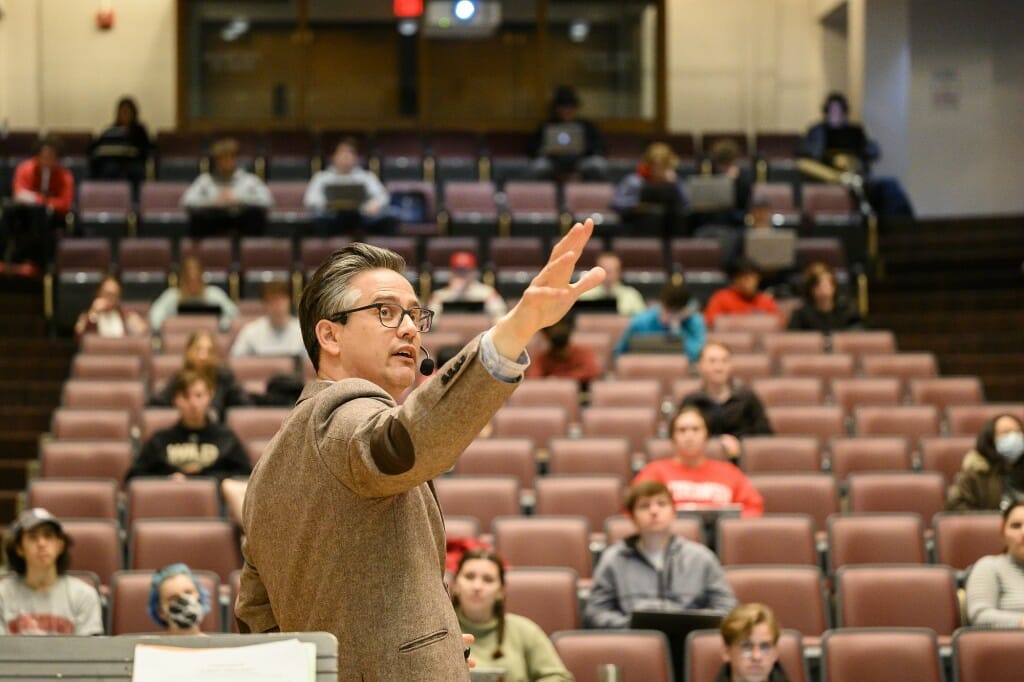
Joshua Calhoun gives a lecture in English 162, Why Shakespeare?, in Mills Music Hall of the Mosse Humanities Building. Photo: Althea Dotzour
Since joining the English department in 2012, Calhoun has emerged as one of its most innovative and transformative instructors. Among his innovations: new courses that bring Shakespeare and environmentalism together, novel assignments that prompt sustained personal engagement and fresh kinds of critical thinking, unique “fieldwork” activities in the Libraries’ Special Collections where students handle and explore 500-year-old texts, and new modes of public humanities and environmental humanities mentoring exemplified in his work with the Holding History program and The Bookish Blog, which includes contributions from his undergraduate and graduate students. A sought-after mentor for graduate students, Calhoun not only challenges their conception about what it means to study early modern literature; he prepares them for presenting their work to different types of audiences and to connect with the public, an invaluable skill for students to learn.
Chancellor’s Distinguished Teaching Award
Juan Egea
Professor of Spanish & Portuguese
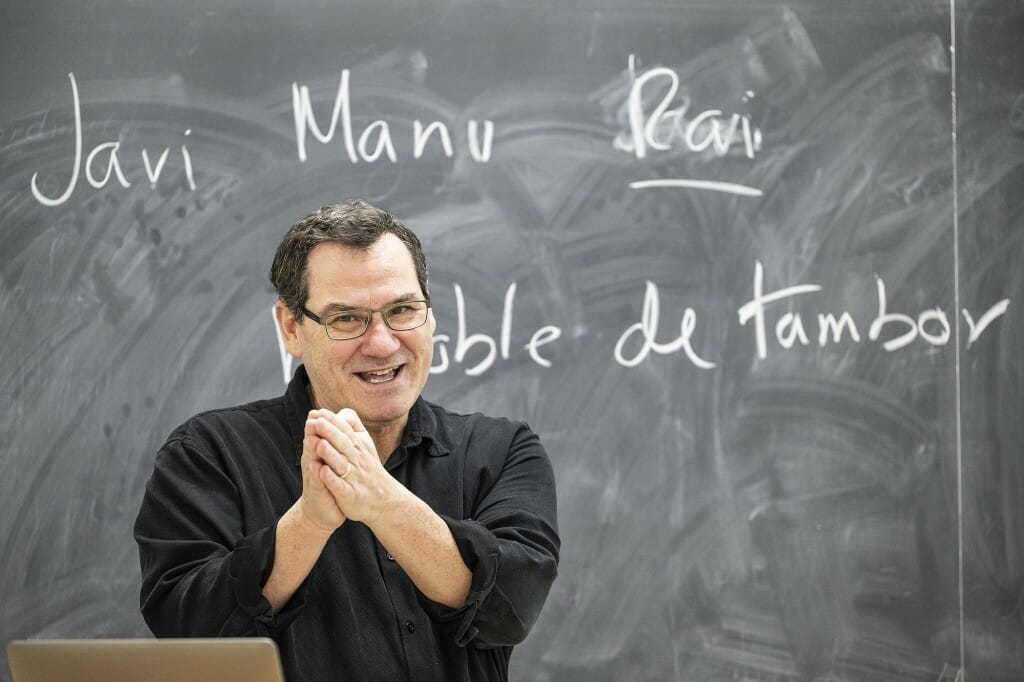
Juan Egea teaches students in Spanish 361, Spanish Civilization, in Van Vleck Hall. Photo: Jeff Miller
Egea consistently receives high evaluations for his graduate and undergraduate classes on contemporary Spanish culture, film and literature. He is able to communicate effectively with a diverse student population and helps students develop critical thinking about practices and concepts related to culture and cultural identity. Egea has introduced instant polling and other on-the-fly assessment tools to make sure his students are following and understanding the material. Recently, he has incorporated performative elements in his lectures, at times speaking to the students in the first person from the perspective of the historical figures they are studying. Egea has directed the study abroad program in Madrid, Spain, and has also served as a study abroad adviser for UW programs in Madrid, Seville, Alcalá, Toledo and Granada. Whether inside or outside the classroom, Egea works to promote language acquisition and help students develop cultural competence about the Hispanic world.
Emil Steiger Teaching Award
Kassem Fawaz
Assistant professor of electrical and computer engineering
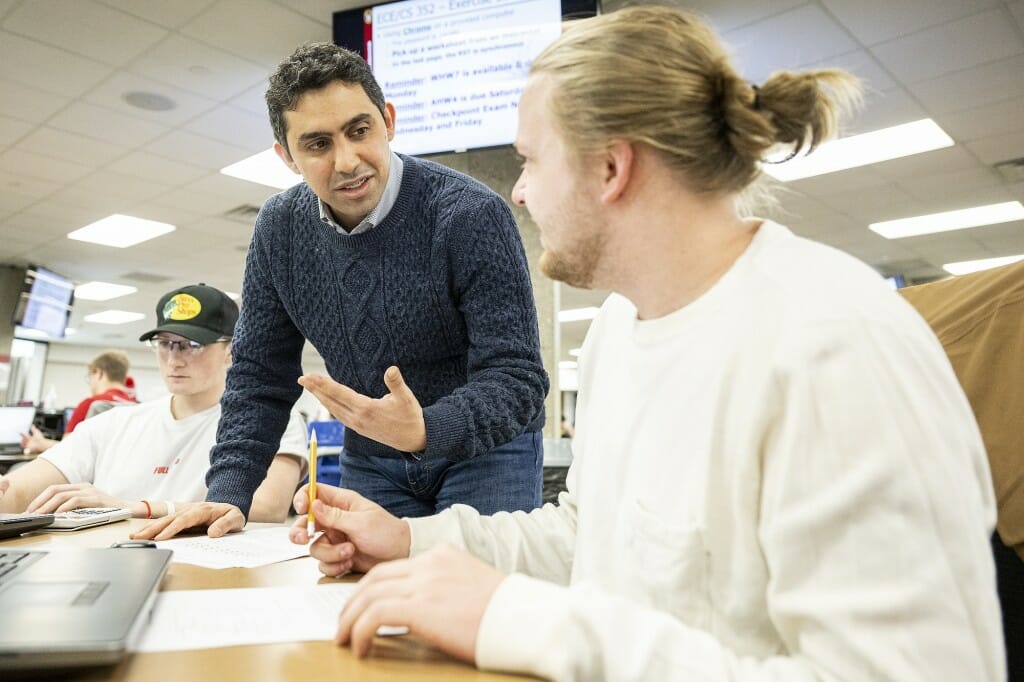
Kassem Fawaz teaches an electrical and computer engineering class in Wendt Commons. Photo: Bryce Richter
Fawaz is a gifted teacher with a naturally student-centered approach. Guided, inclusive discussions are structured to force students to grapple with the ethics as well as the technical design of mobile digital hardware and software. A firm believer in continuous improvement, Fawaz has made several additional enhancements to Electrical and Computer Engineering 454–Mobile Computing Laboratory. In fall 2020, he added a course module on pandemic digital contact tracing techniques and connected it to the other topics presented throughout the course. Students were assigned readings about the societal, ethical and technical issues associated with deploying contact tracing technologies. They then conducted an entire class discussion around these readings. To ensure that the discussion was conducted according to best practices for sensitive topics, he enrolled in and completed the School of Education’s Discussion Project short course. Fawaz keeps students engaged by encouraging discussions, creativity and curiosity.
Chancellor’s Distinguished Teaching Award
Martha Fischer
Professor of piano
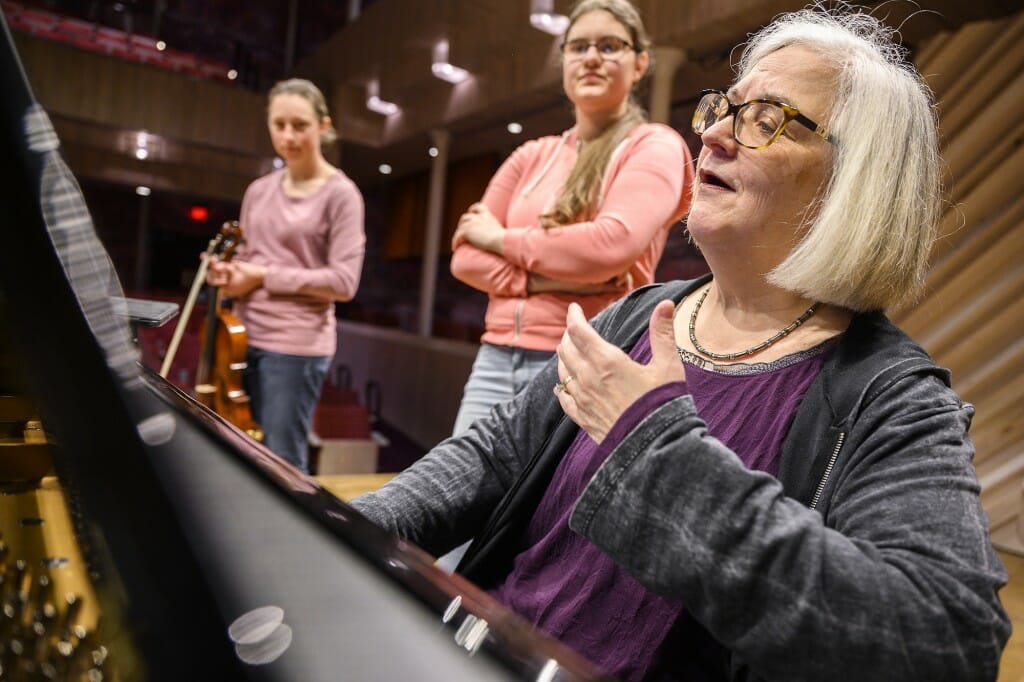
Martha Fischer works with graduate students Alexandra Flint (center) and Esther Delimiter in the Hamel Music Center during doctoral-level private instruction in accompanying. Photo: Althea Dotzour
As an educator, Fischer provides her piano students the considerable skills needed to work together in collaborative music making. She helps students learn to listen and share their interpretative ideas, to make the works they perform together truly larger than the sum of the component parts. Through her guidance, students learn to be dynamic performers, willing to take risks as they craft their performances and work together setting their own goals. Her students have gone on to hold positions as freelance performers and within academe, as well as to take their collaborative training into areas outside music where the lessons learned in her classroom continue to inform and strengthen their work. Fischer is a world-class artist who “practices what she preaches,” serving as an inspiring role model for her students and colleagues.
Chancellor’s Inclusive Excellence Award
Judith Houck
Professor of history and gender and women’s studies
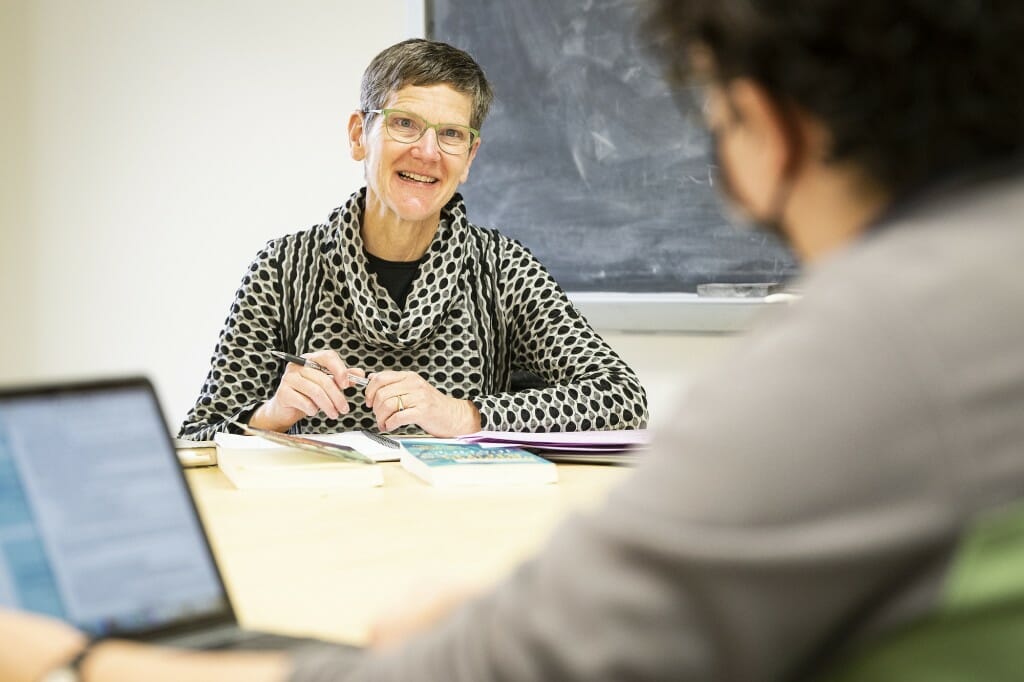
Judith Houck teaches a History of Science class in the Mosse Humanities Building. Photo: Bryce Richter
Houck has profoundly shaped the educational experiences of undergraduate and graduate students in at least four different departments: Gender and Women’s Studies, Medical History and Bioethics, History of Science and History. She is known for inspiring her students, challenging them to think about medicine, gender and society in new ways. Houck approaches the classroom with the same methodological rigor, engagement and aspiration to high standards that mark her scholarly work. More than 15 years ago, she developed a system for student self-assessment and peer appreciation that helps cultivate productive participation in discussions, and since then has shared her system with colleagues and teaching assistants. Houck is beloved by students and colleagues alike for her inspirational teaching and her deeply caring, inclusive support of students.
Chancellor’s Teaching Innovation Award
Stephen Meyers
Professor of geoscience
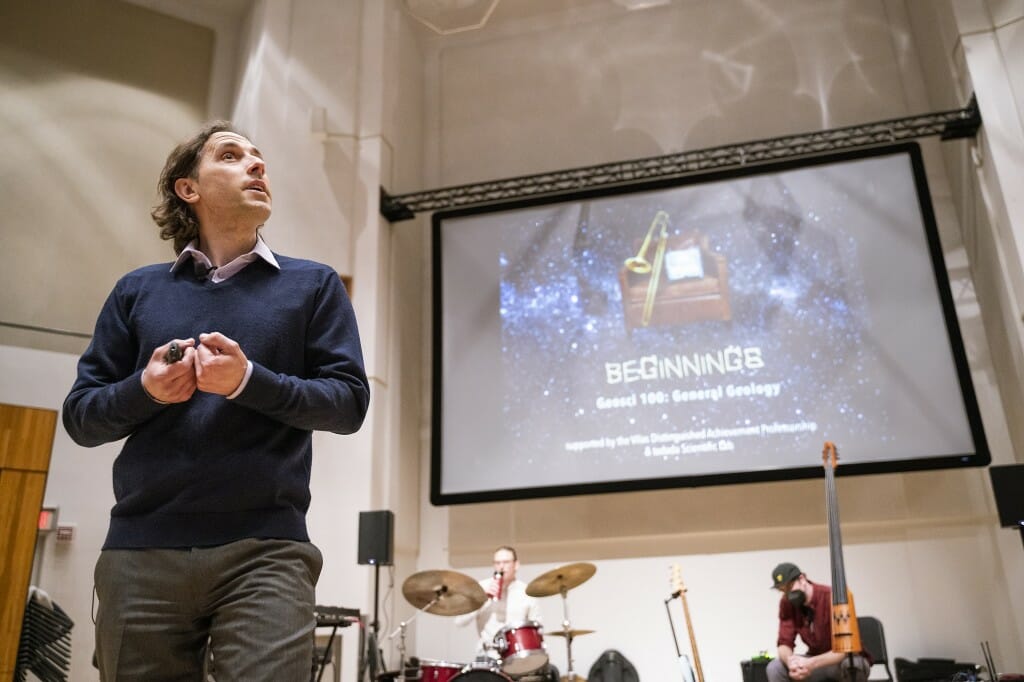
Stephen Meyers teaches a special section of a geoscience class in the Mosse Humanities Building’s Mills Hall. Photo: Jeff Miller
Meyers is an inspirational teacher who has pioneered a bold new approach to introductory science courses. His teaching emphasizes engagement, accessibility, collaboration, clarity and a boundless passion for science. Meyers focuses on forging new emotional connections with science, with the goal of promoting student engagement and broad scientific literacy. His classes incorporate unconventional elements that are designed to capture attention and provoke a response. During a lecture on the origins of the solar system, he invited a live band to provide background music. To help explain the Big Bang, he produced a video demonstration of the Doppler effect, involving a trombone blaring a single note as it was carried in a moving car past a stationary observer. The incorporation of such elements transforms potentially dry lectures into memorable events and dramatically improves retention of important concepts.
Chancellor’s Distinguished Teaching Award
Paula Niedenthal
Professor of psychology
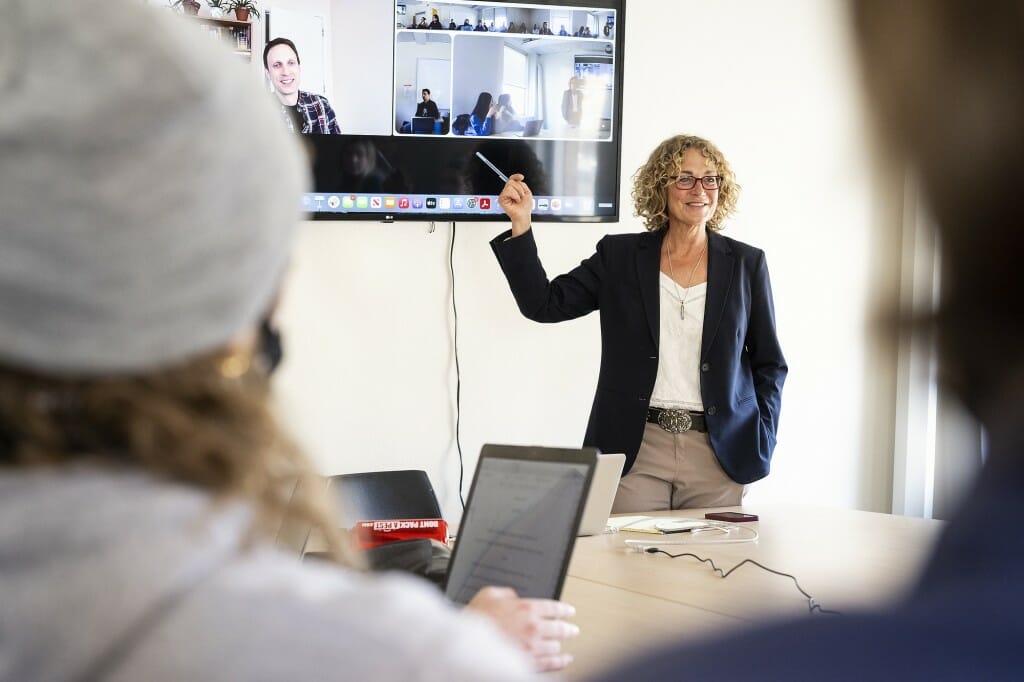
Meeting with her emotions lab research team in the Brogden Psychology Building, Paula Niedenthal introduces virtual guest presenter Sebastian Korb of the University of Essex. Photo: Jeff Miller
Throughout her academic career, Niedenthal has dedicated herself to teaching in innovative ways that are designed to open minds, inspire curiosity and challenge preconceptions. She encourages students to improve their ability to think critically and to engage creatively with classic and new ideas and methods in psychology and related fields. In the classroom, she uses art (specifically, comics), music, discussions with famous psychologists over Skype, and even improvisation and skits as active learning methods. Not only a gifted and effective classroom teacher, Niedenthal is also an outstanding research mentor. Her students credit her with a profound influence on their development as psychologists and researchers. Niedenthal helps students think critically about their research, guiding them as they formulate research questions, design experiments and interpret data. At the same time, she allows them the independence to pursue novel research questions and utilize innovative approaches to address those questions.
Chancellor’s Distinguished Teaching Award
Asifa Quraishi-Landes
Professor of law
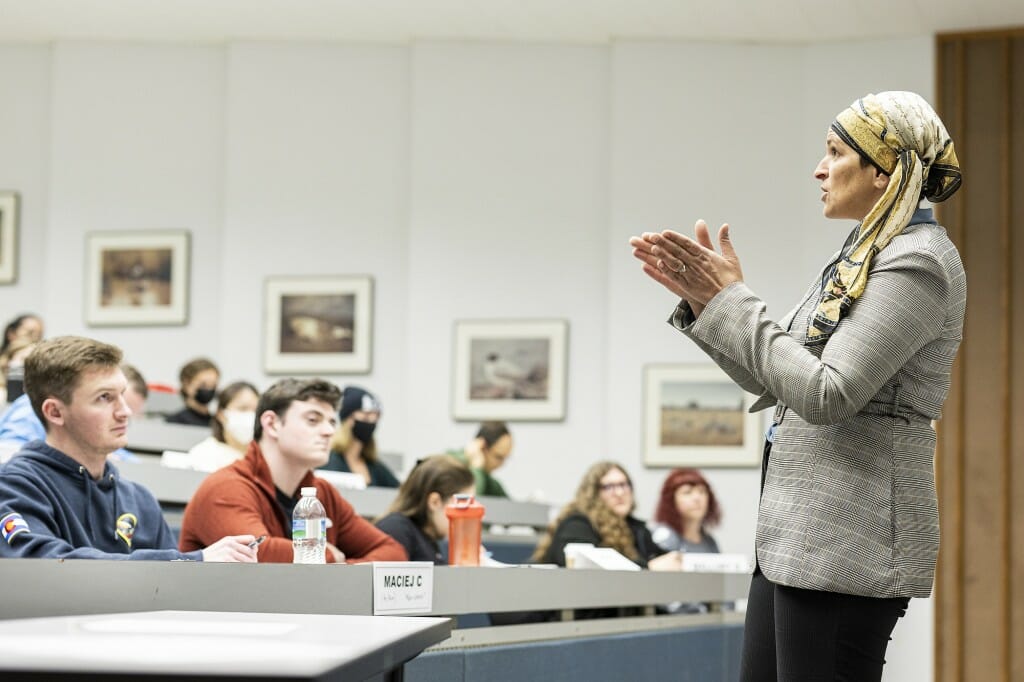
Asifa Quraishi-Landes teaches a Law 731 lecture course in the Law Building. Photo: Bryce Richter
Quraishi-Landes’ student and peer evaluations create a consistent picture of a dynamic, rigorous, motivating teacher who encourages diverse viewpoints and affirmatively seeks to foster open discussion. Generating class discussion is crucial to successful teaching; otherwise, students are passive recipients of lecture material and their learning is less effective. Quraishi-Landes is gifted at overcoming these challenges and generating lively discussions of even the most sensitive constitutional law topics. She encourages students to be thoughtful about the law as not just a set of rules, but a human endeavor with all the complexity and contradictions of society itself. Quraishi-Landes has an unusual ability to make her classroom a nonjudgmental safe space for students to express controversial views with candor. She finds a way to overcome the judgmental air (or fear of it) that emanates from other students by being compassionate and empathetic.
Van Hise Outreach Teaching Award
Rosemary Russ
Associate professor of curriculum and instruction
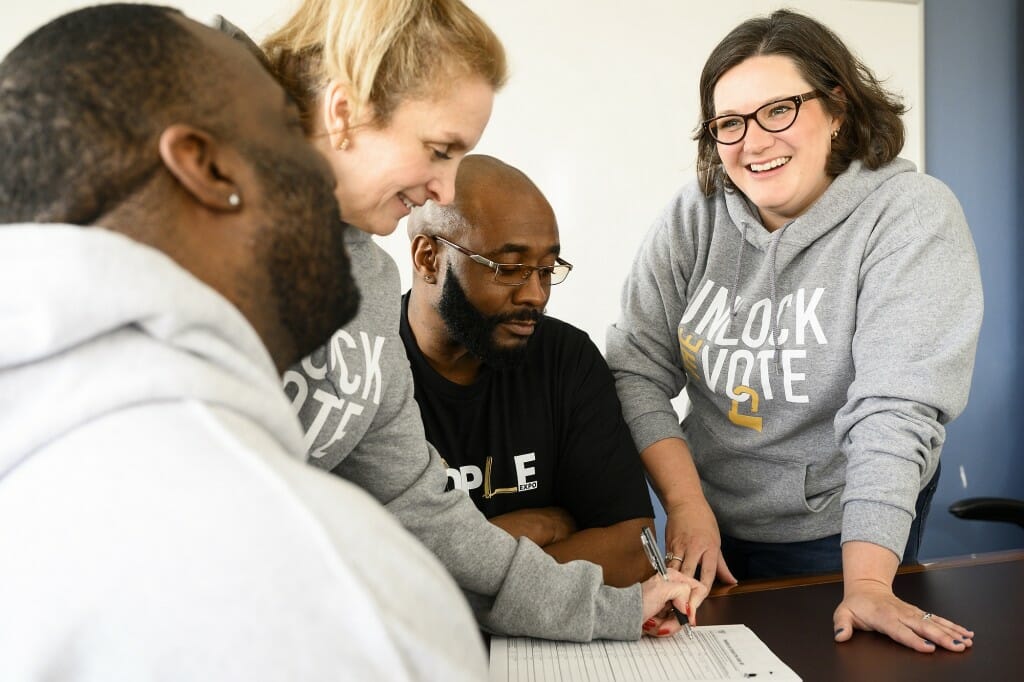
Rosemary Russ (right) works with staff of the criminal justice reform group EXPO (EX-incarcerated People Organizing), where she volunteers as a grant-writer. Photo: Althea Dotzour
Russ directs the campus-wide Madison Teaching and Learning Excellence program (MTLE) to support early career faculty, and has helped redirect the program to embrace inclusive teaching methods more fully. Her research program reflects her commitments to inclusive teaching and learning experiences both in traditional instruction and in her campus service. With her research, Russ has focused on the intersection of “student sensemaking” (i.e., how students work through questions they find meaningful) and inclusive teaching. Her on-campus efforts also extend to doctoral students who are teaching assistants across campus and are preparing to teach elsewhere. Russ has shaped the curricular trajectory of MTLE — now the flagship professional development in teaching program for assistant professors at the university — to reposition equity, diversity and inclusion as indisputable principles in teaching and learning.
Chancellor’s Distinguished Teaching Award
Dietram Scheufele
Professor of life sciences communication
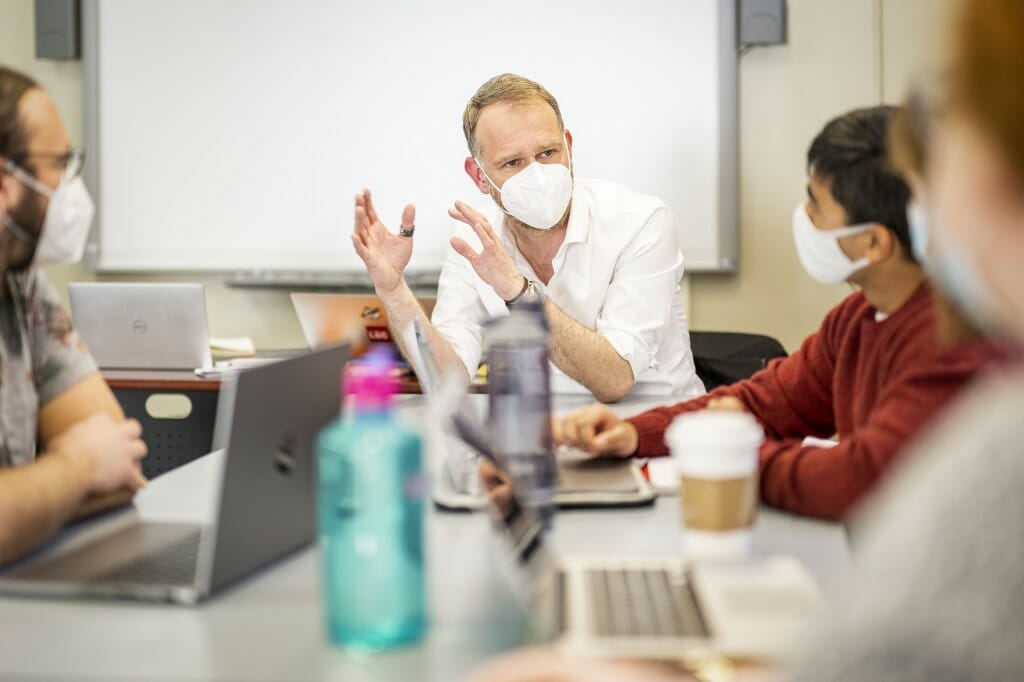
Dietram Scheufele teaches Life Sciences Communication 902 in Hiram Smith Hall. Scheufele and his entire class chose to wear face coverings out of concern for an immunocompromised student. Photo: Bryce Richter
Scheufele’s career has been defined by his belief that being a great academic means being a great teacher. He shows students how research done at UW–Madison is directly relevant to their personal lives and future careers. Eight years ago, he created Science, Media and Society, a new course that looks at the increasingly complex relationship between science, engineering and society. The course is designed to help students understand and meaningfully navigate the controversial public debates surrounding the societal applications of modern science in fields like stem cell research, synthetic biology or artificial intelligence. Course evaluations and comments from students show an appreciation for his ability to make a large lecture hall a safe place for engagement and learning and create an open, respectful intellectual environment where all students are heard.
Chancellor’s Inclusive Excellence Award
Catalina Toma
Associate professor of communication arts
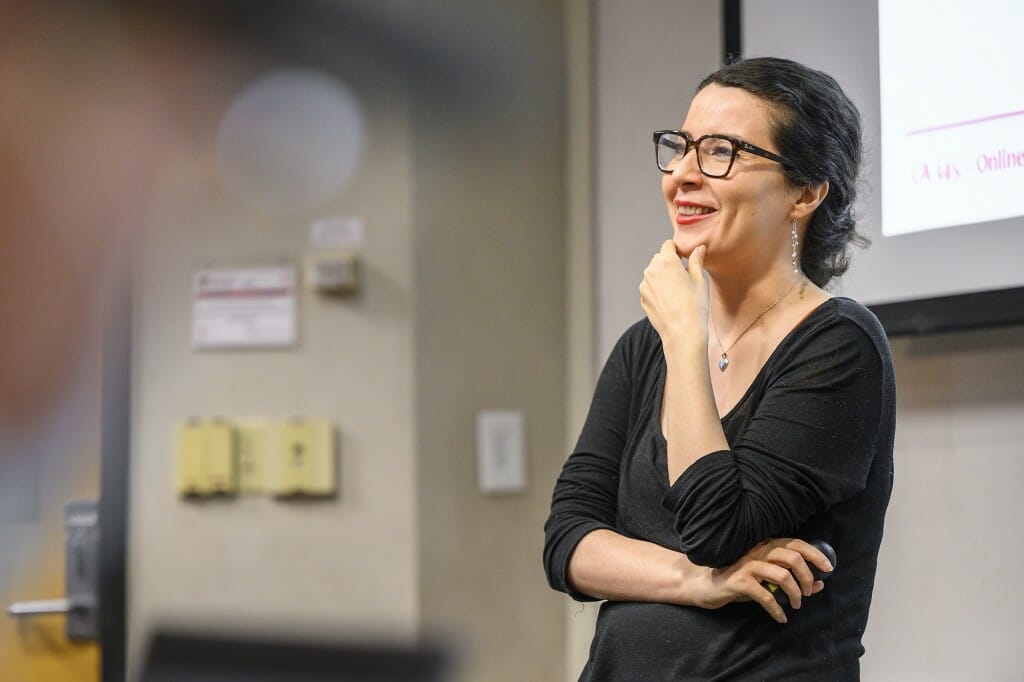
Catalina Toma talks to students in Communication Arts 577, Dynamics of Online Relationships, in Grainger Hall. Photo: Althea Dotzour
Toma’s contributions on campus range from excellent teaching of large numbers of undergraduates, successfully mentoring graduate students, educational innovation in the realms of online and blended learning, campus leadership roles in the service of teaching, and a notable community presence through radio shows, blogs, media coverage and talks. Long before COVID-19, Toma took an interest in how communication technologies can be used to support and enhance students’ learning, and successfully pursued Educational Innovation grants to develop online and blended versions of her large lecture courses. As part of her work with the Diversity and Equity Committee, she has focused on providing training to faculty and graduate students around inclusive teaching practices. Toma has memorably delivered trainings on universal design practices and best practices for supporting international students, and she has helped coordinate department-wide colloquia on trauma-informed pedagogy, microagressions, and best practices for teaching inclusiveness.


